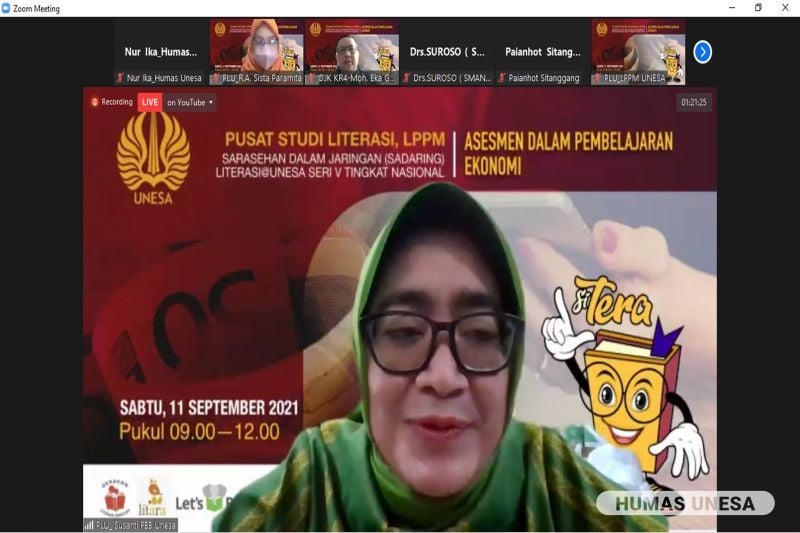
www.unesa.ac.id
Unesa.ac.id, SURABAYA-Implementation of the Minimum Competency Assessment (AKM) and literacy have become important and interesting topics of conversation lately. Therefore, the Center for Literacy Studies, LPPM UNESA held a Series V Literacy Network Workshop (SADARING) at the National Level with the theme "Assessment in Economic Learning" on Saturday (11/09/2021).
A total of 136 participants from teachers, students, lecturers to the general public participated in the activity. The speakers who were presented were, Moh. Eka Gonda Sukmana, SE, MSi, CRISC as Deputy Director of LJK 4 Supervision and Licensing of Regional Financial Services Authority 4 East Java, Dr. Susanti, M.Sc., as Lecturer of the Faculty of Economics and Business UNESA, and Susi Agustini, S.E., M.Sc., as Teacher of SMAN 1 Panji Situbondo AGEI East Java.
The event was opened by Dr. Anang Kistyanto, S.Sos., M.Sc. He said that the Chancellor of UNESA Prof. Dr. Nurhasan, M.Kes., was very supportive of the event. According to him, the activity supports the policy of the Ministry of Education and Culture, Research and Technology of the Republic of Indonesia. "This topic is interesting in line with the policy of the Minister (Nadiem Makarim, ed)," he said.
In implementing AKM at the primary and secondary education levels. Teachers and students must be familiar with AKM models and their learning. Teachers should be able to make questions equivalent to AKM. "Therefore, we hope that this activity can support the maximization of AKM in schools," hoped Anang.
Moh. Eka Gonda Sukmana on that occasion discussed the level of literacy and financial inclusion of the Indonesian people. According to him, the level of financial literacy of the Indonesian people in the capital market, pension funds, and insurance is still low.
He explained that the 2019 survey showed that the industry with the lowest level of financial literacy was the capital market, then the second lowest was in terms of pension funds, and third was finance. "Because the literacy level of the community itself is still low," he said.
Eka Gonda reminded not to be easily trapped in illegal investments. For this reason, participants must be aware of various forms of illegal investment. "Don't be tempted by high interest rates before you understand investment and its modes," he said.
Because, he continued, perpetrators usually use the names of religious leaders, community leaders and celebrities who are respected by the community to attract victims. "So, the public must know 2L, namely, legal; having licensing status from legal entities and products, and being logical; having reasonable returns and having risks," he explained.
Meanwhile, Susanti discussed the Design for Development of AKM Equivalent Questions Based on Scientific Context in Economics and Accounting Subjects. Susanti explained, there are important things to consider in writing about economics and accounting equivalent to AKM.
In making an assessment, it is necessary to pay attention to material that is in accordance with the question indicator or called a stimulus. Examine the material in terms of the benefits, relevance, and reflection tested and the important questions tested.
After that, the questions made must be able to measure the basic abilities of students in the form of analyzing, evaluating, and creating. Finally, select the type of questions to be tested according to competence, which can be in the form of multiple choice questions, complex multiple choice questions, and matching questions.
On that occasion, Susi Agustini discussed the Implementation of Scientific Context in AKM Equivalent Problems in Economic Learning. Susi also gave examples of AKM reading literacy and numeracy literacy questions. "Well, for the AKM grid, the difference is seen in the content and context for reading literacy, while for numeracy literacy, it uses domains and subdomains," said the teacher of SMAN 1 Panji Situbondo AGEI East Java. (Esti/zam)
Share It On:






